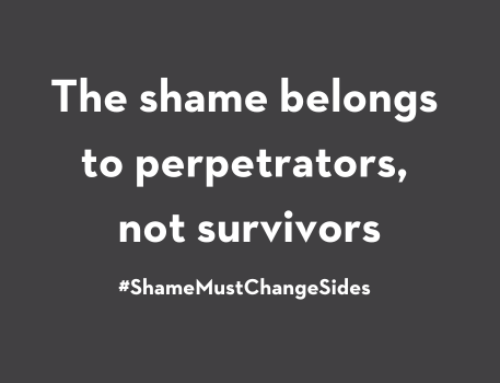
It’s important to understand that when someone shares their experience with you, the best thing you can do is listen to their feelings, thoughts and needs, and to support them in their healing process, whatever that may be. Everyone who experiences sexual assault will have different ways to handle the situation and to heal.
With this in mind, here are 10 DOs and DON’Ts to help you offer support in a way that puts the survivor first:
DON’T:
1. DON’T push them to disclose more information than they are willing to. If a loved one tells you they have been sexually assaulted, you might have questions about it, such as the who, what, where, when and how of the situation. It’s important to know though that some people may be open about it and others may not be, and it’s critical to respect that. It’s their decision what information they want to share.
2. DON’T try to convince them to go, or not to go, to the police. Many people who have experienced sexual violence make the decision not to tell the police. There are a ton of reasons why they might choose to do so and all are valid. You may be tempted to say, “you don’t want this to happen to someone else” or “you would get closure and justice if (s)he was behind bars.” However, going to police and pressing charges can be very traumatic and can lead to results that further hurts them. Alternatively, be sure to support them if they do decide to speak with the police. It’s important now more than ever that you allow the survivor to make their own decisions without pressure.
3. DON’T question their experience. Let’s say your loved one tells you that it was your friend or family member that assaulted them. You may not want to believe that this person would do such a thing, or find yourself wanting to ask the survivor if they are sure it wasn’t a misunderstanding. No matter how difficult it can be to accept that someone you care about is a perpetrator of violence, give the survivor the benefit of the doubt. Statistics show that women experience about 553,000 incidents of sexual assault each year in Canada and less than 10% of these are reported to police. Many survivors find it difficult to come forward when they experience sexual assault because they are often disbelieved. If someone discloses to you it’s important to show them that you believe them and that their experience and reaction to it are valid.
4. DON’T expect them to cope or feel a certain way. After disclosing to you they may act like nothing happened, or years after the assault they may still be struggling to deal with the trauma. This may seem confusing but it’s important to remember that there is no right or wrong way to heal, no timeframe for recovery, and that everybody handles things differently. Be patient, empathize and follow their lead.
5. DON’T place any judgements or blame. It doesn’t matter who they went out with, where they went, or if they drank too much. No one deserves to be assaulted, so this is not the time for an “I told you so.” Avoid any questions or comments that make the survivor feel responsible for what was done to them without their consent, or that invalidates their feelings in any way. Refrain from sentences starting with things like, “Why did/didn’t you…” or “shouldn’t you have…” Instead, remind them “it’s not your fault” and “I believe you.”
DO:
1. DO be sensitive to triggers. After experiencing a traumatic event certain things may unexpectedly remind that person of what they have experienced, which can cause intense emotional and even physical reactions. They may experience anger, fear, flashbacks, or panic attacks, along with many other responses. Not everyone will have these types of reactions, but if they do it’s helpful to try and learn what sorts of things causes them to be triggered. If something does trigger a survivor it’s important to help get them out of the situation, reassure them that they are safe, and remind them that this reaction is okay. If you are unsure about something, Is It Consensual is a great resource for what movies, TV shows, and other activities may be triggering.
2. DO practice self care. You might want to do everything you can to help support your loved one and take their pain away, which is caring and wonderful, but not if it comes at a cost to your own wellbeing. Remember that you cannot and should not try to fix all of someone else’s problems; it is healthier for both of you if you are there to listen and be supportive. If someone you care about is sexually assaulted, it will may directly affect you in some way and that is okay. In order to support the survivor to the best of your abilities, you need to understand your own feelings and needs as well.
3. DO assure them that the sexual assault was not their fault. This may seem obvious but it’s very important and bears repeating. As they work to heal, the survivor may begin to think that there were things they could have done to prevent the assault. Even if they originally seem to understand it is not their fault, they may begin to question whether that is true, especially if they speak to people who victim blame. Assure them every step of the way that they are not responsible for the perpetrator’s choices and actions, and that there is no consent without an enthusiastic and ongoing yes.
4. DO help them find any resources they need. If they make the decision to speak to a counsellor, get medical help, or go to a support group, it might be frightening or overwhelming to find the right place. If they tell you they may want to go somewhere for support, offer to help them look for resources, make appointments, and bring them to places if they want you to. Remember, if they don’t want to seek out certain kinds of support, or if they change their mind, respect that decision and do not pressure them.
5. DO respect their personal space. After hearing about your loved one’s experience you may want to give them a big hug or show physical affection. While some people may be okay with that, others may be uncomfortable with physical contact at the moment. Always ask if touching is alright, even if it’s something small or they said yes the last time. Get consent. This is especially important when the person is a partner or someone you are intimate with. If they feel uncomfortable with physical contact, that doesn’t mean they don’t love you or care for you.
67% of Canadians say they personally know someone who has experienced physical or sexual assault, but that number only includes those that know for sure. Given the prevalence of violence against women and girls, the actual number is likely much higher. Chances are you know someone who has experienced sexual or physical violence.
These suggestions on how to support someone who has experienced sexual assault may not work for everyone, but they are a useful starting point as you communicate with and find the best way to support your loved one. The most important thing to remember is that no matter how a survivor handles the situation, having someone who is willing to support them, listen to them and put their needs first goes a long way.
For more tips on how to support someone who is experiencing violence, see our Avon tip sheets.
If you know someone who has experienced sexual assault, you can find more information on how to support them, crisis counselling and other services through your local sexual assault centre, shelter or crisis line. If you or someone you know is in immediate danger, call 911.
Learn More
Take Action
- Take the pledge to join GEN1 and help build the first generation free of violence against women and girls.
- Sign up for our e-newsletter to have our latest stories and resources sent to your inbox.
- Follow us on Facebook and Twitter to join a national conversation on ending violence.







